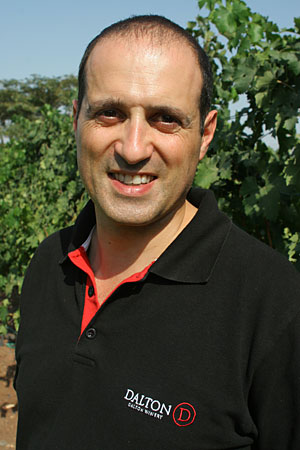Kosher Wine Is Not Just for Passover
Alum wants to bring Israeli wines to the world

In 1991, Alex Haruni left his family’s gemstone business, moved to the Israel-Lebanon border looking for a new trade, and settled on an unlikely occupation: winemaker.
Haruni (MET’95), a London native, owns and runs Dalton Winery in Upper Galilee. If he has his way — and if the winery’s reputation continues to grow — Israel’s kosher wines will finally make the transition from minor embarrassment to point of pride.
“The average consumer’s perception of kosher wines is that of sweet sacramental wine, such as Manischewitz,” he says, referring to the traditional preference for most American Jewish families as they gather tonight for the annual Passover seder. “But kosher wines have been very unfairly lumped together.”
For nearly a year, Haruni and his father researched tourism-related businesses near Galilee, hoping to find a way to draw jobs, tourists, and new companies to the struggling region. They settled on a winery that was on the verge of bankruptcy and needed major investment.
His father helped him buy the fields and facilities in 1993. With a combination of “patience, perseverance, and very deep pockets,” Haruni says, the winery’s output grew from 30,000 bottles to 900,000 last year.
Haruni’s foray into the wine world coincided with his BU education. In the years leading up to Dalton’s launch, he earned a master’s in business through Metropolitan College’s part-time nonresidential degree program.
He learned some valuable lessons from that hectic time. One course taught pricing as both an art and a science, a relevant concept for a company that has to “build demand from below,” he says. “We were building a brand from nothing.”
If Israeli commercial winemaking was “more or less in its infancy” when Dalton wines debuted in 1995, then the industry is now experiencing an exciting, unpredictable adolescence. A decade and a half later, Israeli winemakers are still trying to make their product stand out.
The hard part, Haruni says, is convincing wine drinkers, especially in the United States, that a kosher merlot makes just as good a housewarming gift or dinner party offering as a nonkosher variety. He hopes to capture wine drinkers’ attention in Israel, where fine wines are finally going mainstream, and in Europe, where tastes have been refined by centuries of wine appreciation.
“The Israeli wine market has become a lot more sophisticated since we started,” says Haruni. The winery sells 70 percent of its wines — from standards like cabernet sauvignon to reserve-label zinfandel and shiraz — within the country. But developing an international demand means Dalton won’t rely too heavily on domestic sales — a pragmatic strategy, he notes, considering the “degree of political instability in Israel.” While the winery’s production hasn’t been affected by the conflict between Israel and Lebanon, a larger war could damage Israel’s economy enough to hurt producers of luxury goods.
Although kosher wines are commonplace in Europe, according to Haruni, Israeli labels barely register next to offerings from France, Spain, and Italy.
“Our biggest problem is that people don’t know Israel makes quality wines,” he says.
Other producers share Haruni’s vision. Dozens of boutique wineries have sprung up around the country. In the newly crowded field, Dalton has managed to make a name for itself, in part because of Haruni’s decisions to hire Israel’s only female winemaker and to promote wine tourism and education. In addition to offering guided tours of the vineyard, Haruni blogs about winemaking.
Dalton is more than just a challenging new venture or a potential profit engine. It’s a symbol of the roots Haruni has always hoped to plant in his spiritual homeland.
“It’s a business investment and a Zionistic investment,” he says.
Katie Koch can be reached at katieleekoch@gmail.com.
Comments & Discussion
Boston University moderates comments to facilitate an informed, substantive, civil conversation. Abusive, profane, self-promotional, misleading, incoherent or off-topic comments will be rejected. Moderators are staffed during regular business hours (EST) and can only accept comments written in English. Statistics or facts must include a citation or a link to the citation.